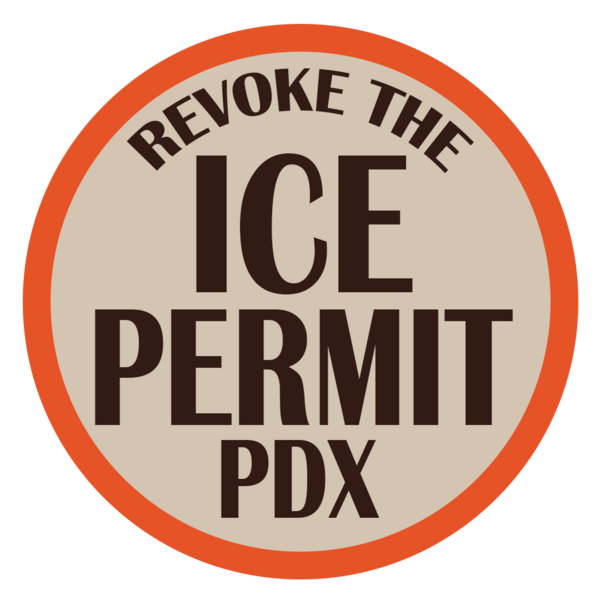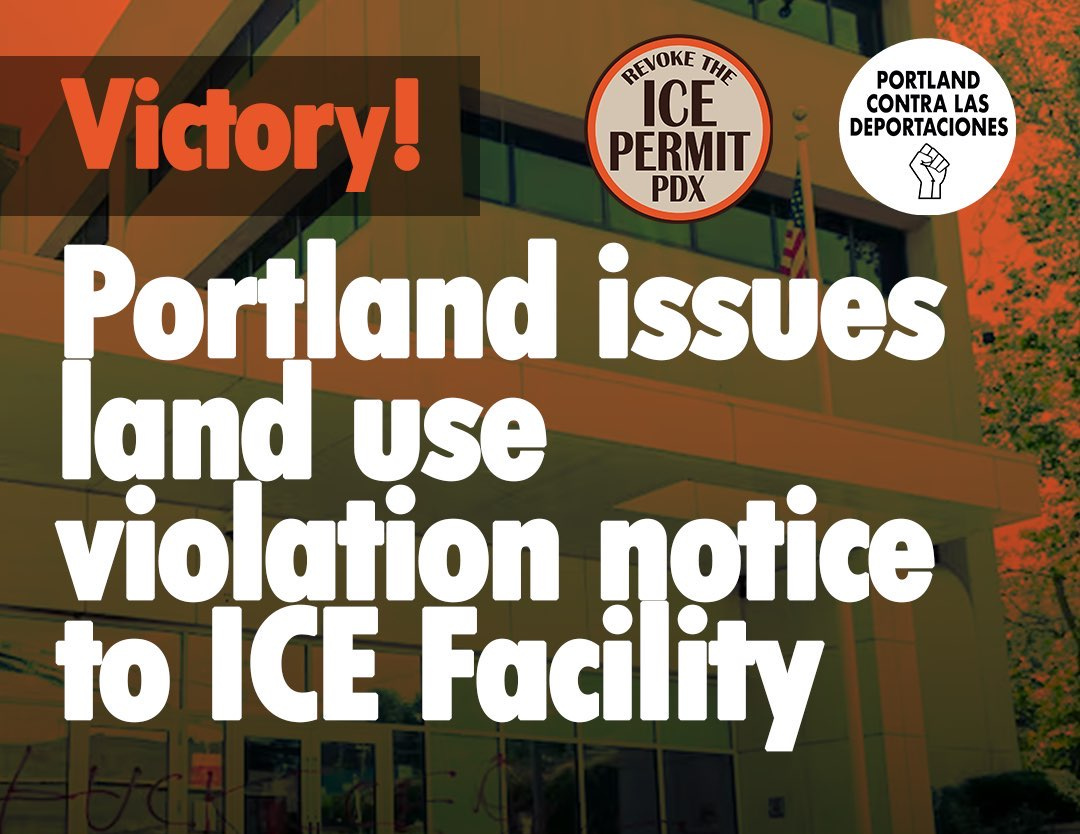The Deportation Machine Next Door: Why Portland Needs to Revoke ICE's Permit
A lot of Portlanders know about the protests. They’ve seen the smoke, read the headlines, and watched the footage. But what many still don’t realize is what happens inside that plain beige office building off Macadam, quietly sitting next to a K–8 school.
This is Portland’s field office for Immigration and Customs Enforcement, specifically its Enforcement and Removal Operations division. It’s where federal agents process the people they’ve arrested across Portland, often during early morning raids. Here, people are fingerprinted, interrogated, and handed over to the federal deportation system. From this office, ICE coordinates transfers to faraway detention centers like Tacoma and arranges flights to deport people out of the country entirely.
Governor Tina Kotek has defended the facility by stating that it isn’t a detention center. Technically, that’s true. However, the facility is explicitly defined as a detention center in its 2011 Conditional Use Permit. [Correction] There are no long-term holding cells here. But that framing hides the real function of the building. This is where people are processed into the deportation system. Agents conduct interrogations, issue removal orders, and coordinate transfers to distant detention centers and deportation flights. Families are still torn apart because of what happens inside these walls. Calling it “administrative” doesn’t make the harm any less real.
All of this is happening quietly in our city because we allow it.
The building doesn’t even belong to the federal government. It’s privately owned by a local company, 4310 Building LLC, and leased to ICE through a contract with the U.S. General Services Administration. A private landlord profits by renting space for deportation operations inside Portland city limits.
The facility operates under a conditional use permit issued by Portland’s city government back in 2011. City Council still has the power to revoke that permit.
Many Portlanders are surprised to learn this. After all, we call ourselves a sanctuary city. But while we embrace that label, we’ve allowed a key hub of ICE’s deportation machine to operate right next to a K–8 school, The Cottonwood School of Civics and Science. Only a narrow bike path separates federal deportation operations from Portland kids playing at recess.
This isn’t hypothetical harm. It’s happening right here.
So much violence
During recent ICE Out of Portland protests, federal officers deployed tear gas, pepper rounds, and other crowd-control munitions directly next to the school grounds. Swabs taken directly from the spent canisters were sent to a local lab for analysis. The lab confirmed the presence of HC gas, a military-grade chemical agent banned from use in war due to its long-term health risks, as documented in the video created by a local portlander below.
This isn’t the first time the school has been impacted. After returning to in-person classes following COVID closures in 2020, parents found spent tear gas canisters and rubber bullets scattered across their children’s playground, left behind from earlier federal crackdowns.
The harm extends beyond the schoolyard. Retired residents at nearby Mirabella had to modify their HVAC systems after toxic gas seeped indoors. A local nurse was shot in the eye with a “less-lethal” round fired by federal agents, a head-level shot that violates use-of-force guidelines. Many hoped these kinds of violent crackdowns wouldn’t happen here, but the infrastructure that enables them remains fully intact.
In some cases, protesters have been charged under Oregon’s outdated riot statute, a law originally passed during the reactionary backlash to the Civil Rights and Vietnam War protests of the 1960s. That law gives broad discretion to police and federal agents to escalate peaceful gatherings into “unlawful assemblies,” triggering aggressive force. The same vague law that was used to justify crackdowns downtown has now been used repeatedly to target protests outside the ICE facility. Portlanders who show up peacefully are being criminalized for bearing witness.
This isn’t just about immigrants. It’s about all of us.
ICE has a long history of mistakenly deporting U.S. citizens due to paperwork errors, racial profiling, and bad information. Lives permanently upended because a federal bureaucracy made a mistake. The Portland office helps process the paperwork that makes those mistakes possible. This is not some faraway injustice. It is happening here.
As historian Adam Goodman documents in The Deportation Machine, this kind of harm is not accidental; it’s the product of a system intentionally designed to spread enforcement across decentralized offices, paperwork pipelines, and private contractors, making accountability diffuse, while the human cost remains devastatingly concentrated.
Even elected officials are not immune. In both California and New York, Democratic lawmakers have been physically blocked, detained, or even tackled simply for trying to observe, ask questions, or advocate for their constituents during ICE enforcement actions. The message is clear: not even those we elect are safe from retaliation when they try to hold these operations accountable. As long as facilities like this remain embedded inside our cities, political violence isn’t hypothetical. It’s part of the machinery.
We can change this
Other cities are already taking action. Portland can too.
Just last week, Glendale canceled its ICE contract. Newark is shutting down ICE operations due to permitting violations. These cities are drawing a line, not to end federal enforcement entirely, but to refuse complicity in an unjust system. Portland has that same legal authority. Revoking ICE’s conditional use permit wouldn’t make federal agents disappear, but it would make their operations here much harder.
A grassroots petition is already live, and it’s working.
As of today, nearly 12,000 Portlanders have signed the petition calling for City Council to revoke the permit. Political research shows it often only takes about 3.5% of a city’s population to create real pressure for policy change. In Portland, that’s around 21,000 signatures. We’re already more than halfway there.
This isn’t about left or right. It’s about what kind of city we want to live in. Do we allow a quiet deportation hub to operate in our neighborhoods, next to our schools? Or do we live up to the values of safety, fairness, and accountability we say we believe in?
Portland can make a different choice. But only if we act.
If you want to learn more, you can read the petition here: Revoke ICE’s permit — Petition link And watch this short explainer made by local Portlanders: Video explainer
Many of us have also stopped by the memorial growing outside the facility. Quietly reading the stories, placing flowers, and bearing witness. Every person who takes a moment to show up makes it harder to pretend this isn’t happening.
Solidarity makes Portland bloom.
Correction (July 2025):
An earlier version of this post referenced a statement by Governor Tina Kotek claiming the ICE facility at 4310 S Macadam Avenue was not a detention center. However, after reviewing the Conditional Use Permit (CUP) issued by the City of Portland in 2011, we now know this is incorrect. The CUP explicitly defines the facility as a detention facility, with specific operating conditions related to custody and security.
While officials may characterize the facility as “administrative,” its legal classification and operational purpose confirm it is, in fact, a detention center. We have updated the post to reflect this more accurate description.
We believe in transparency and will continue to correct the record as new information emerges.
you can view the conditional use permit here https://efiles.portlandoregon.gov/record/16222724/
and the other relevant documents here https://efiles.portlandoregon.gov/Record?q=recAnyWord%3A11-124052&sortBy=recCreatedOn&pagesize=25



